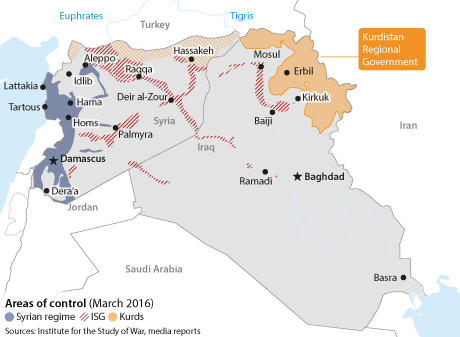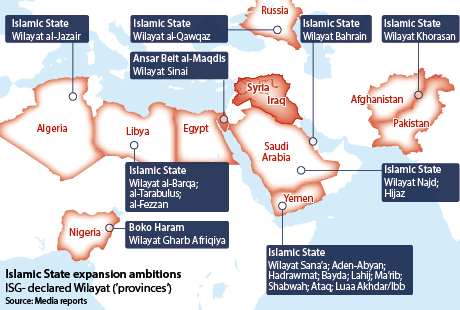Islamic State will intensify global operations
The Islamic State group will redouble efforts to defend its territory through fiercer operations, at home and abroad
A manhunt is underway in Belgium as authorities look for two suspects over the March 22 attacks in Brussels that left at least 31 people dead and hundreds injured. Islamic State group (ISG) claimed responsibility for the attacks. Nearly two years since its June 2014 offensive in Syria and Iraq, ISG still controls and governs significant territory. The organisation is preparing for a prolonged fight within those countries and has also scaled its efforts globally, gaining regional affiliates and launching increasingly sophisticated international attacks.
What next
The group will intensify terrorist and guerrilla attacks to defend its territory within Iraq and Syria, while seeking opportunities to intensify the Syrian civil war. It may even expand its bombing campaign in neighbouring countries, such as Turkey, Lebanon and Jordan, in order to foment greater disorder that would create opportunities to expand. Spectacular attacks in the West will also continue, particularly in Europe, as the group aims to foment anti-Muslim sentiment that would alienate Muslim Europeans from their societies and so become more susceptible to the ISG message.
Subsidiary Impacts
- ISG will use its territory in Iraq and Syria to support jihadists abroad, helping them to launch more frequent and sophisticated attacks.
- ISG efforts to provoke conflict will create opportunities for it and other extremist groups, particularly al-Qaida, to gain support.
- Uncoordinated Western military support to anti-ISG groups in Libya will likely prolong its civil war, enabling ISG's continued growth.
Analysis
ISG's grand strategic objectives have remained the same since it declared its 'caliphate' in June 2014. The organisation seeks to:
- expand its caliphate to include all historically Muslim lands; and
- provoke and win an apocalyptic war with the West.
In pursuit of these goals, ISG is executing three parallel campaigns that aim to: defend and expand its terrain across Iraq and Syria; develop jihadist affiliates in North Africa, the Middle East and Asia; and inspire and direct attacks to terrorise and polarise the West.
Evaluating ISG's success requires assessing how well the organisation is advancing along these objectives.
Iraq and Syria
ISG has suffered significant territorial losses over the past six months and is under increasing pressure from the US-led coalition and the more recent Russian-Syrian-Iranian operations against it.
The group lost the city of Ramadi in western Iraq to Iraqi security forces in December 2015. It also lost its strategic logistics hub of Shaddadi in northeastern Syria to the US-backed Kurdish and Arab Syrian Democratic Forces in February 2015. The Bashar al-Assad regime is currently conducting an offensive against ISG's positions near Palmyra, central Syria, with Russian air support.
These operations increase ISG's defensive requirements even as it faces logistical challenges. The US-led coalition's 'Operation Tidal Wave II' has significantly decreased ISG's oil revenue, contributing to the group's reported decision to cut its fighters' salaries in late 2015.
Coalition airstrikes also killed senior personnel, including military commander Omar al-Shishani in March 2015, likely inhibiting the organisation's ability to coordinate cross-border military operations in the short term (see SYRIA/IRAQ: Leadership losses to weaken Islamic State - January 8, 2016).
Despite territorial losses in Iraq and Syria, ISG will hold on
ISG may withdraw from forward positions in central Syria and Iraq's Anbar desert to consolidate its military forces in the Deir ez-Zour Valley, eastern Syria. No ground forces, including international forces, currently possess the will and capability to defeat ISG in this terrain, which provides critical connectivity between ISG's Syrian and Iraqi theatres.
Intensified campaign
ISG has already intensified its bombing campaign across Iraq and Syria in response to military pressures. The group seeks to provoke wider chaos within those two countries in order to open new opportunities for expansion.
The group is particularly focussing on Shia military and civilian targets. It killed more than 150 people on February 22 in attacks on the Shia Sayyida Zeinab shrine in Damascus and a pro-regime neighbourhood in Homs City, Syria. ISG also launched a massive suicide truck bomb in Babil Province, southern Iraq on March 6, its largest attack in the province ever.
Neighbouring countries
ISG is also attempting to destabilise countries neighbouring Iraq and Syria. An ISG-linked suicide bomber attacked foreigners in a popular tourist area of Istanbul on March 19, likely seeking to harm Turkey's economy and possibly also to exacerbate existing conflict between the Turkish government and Kurdish militants (see TURKEY: Harsher grip will speed drift to violence - March 14, 2016).
Authorities also raided ISG-linked cells planning attacks in Jordan on March 2 (and Iran on March 14).
International networks
ISG is fostering affiliates in North Africa, the Middle East and Asia.
It supports local efforts to seize terrain and exacerbate regional disorder in preparation for the central leadership's desired expansion beyond Iraq and Syria. The most advanced affiliates -- which are in Libya, Egypt and Afghanistan -- give the organisation strategic resiliency: if ISG was defeated entirely within Iraq and Syria it would be able to survive through those affiliates.
Middle East affiliates
ISG's affiliate in Libya controls and governs a contiguous territory between Sirte and Bin Jawad on the central coast. The affiliate is steadily gaining recruits and developing military strength with the aid of leadership sent from Iraq and Syria (see LIBYA: Islamic State aims to build regional hub - November 19, 2015).
It is using its sanctuary in Libya to develop links with jihadist groups in Tunisia and Algeria. ISG-linked Tunisian militants launched a major attack in the eastern Tunisian city of Ben Guerdane on March 7.
ISG central will continue to strengthen its affiliate in Libya
In Egypt, Wilayat Sinai is conducting a bombing campaign to intimidate and degrade Egyptian security forces on the Sinai Peninsula.
Asia
Wilayat Khorasan lost much of its terrain in Afghanistan's eastern Nangarhar province in early 2016 (see AFGHANISTAN: Taliban contain Islamic State's reach - November 17, 2015). However, it still launches occasional attacks in that province and is increasing activities in Afghanistan's Ghazni and Paktika provinces as well as in the tribal areas of Pakistan.
ISG may declare a formal affiliate in South-east Asia in the near term
ISG is also building relationships with jihadist groups in Bangladesh and South-east Asia, and likely seeks to establish formal affiliates there in the near term (see INDONESIA: Islamic State threat is changing - February 15, 2016).
North Caucasus and Central Asia
Wilayat Qawqaz in Russia's North Caucasus region claimed its first explosive attack on February 15, suggesting the group's growing presence there. There are hundreds of fighters from the Caucasus and Central Asia fighting with ISG in Syria and Iraq. In fact, ISG is the first jihadist group to acquire some level of support in all five Central Asian republics (see CENTRAL ASIA: Islamic State risks can be managed - March 4, 2016).
The West
ISG retains the intent and capability to attack the West. Its local operatives are supported by a significant domestic network, as described in a leaked report for the French interior ministry on March 20.
ISG will continue to use its safe haven within Iraq and Syria to provide military training to those wishing to launch attacks in the West. ISG hopes these attacks will spark cultural conflict in Europe and the United States, fuelling radicalisation and destabilising communities.
Outlook
ISG is preparing for the long-term defence of its caliphate within Iraq and Syria. The group and other Salafi-jihadist organisations such as al-Qaida will ultimately benefit from a US-led coalition approach that prioritises action against ISG over addressing the underlying sectarian and nationalist grievances fuelling the Syrian civil war and the regional proxy war between Saudi Arabia and Iran.
ISG's concerted campaigns to prolong conflicts will ensure the survival of its safe haven in the medium and possibly long term.


_350.jpg)